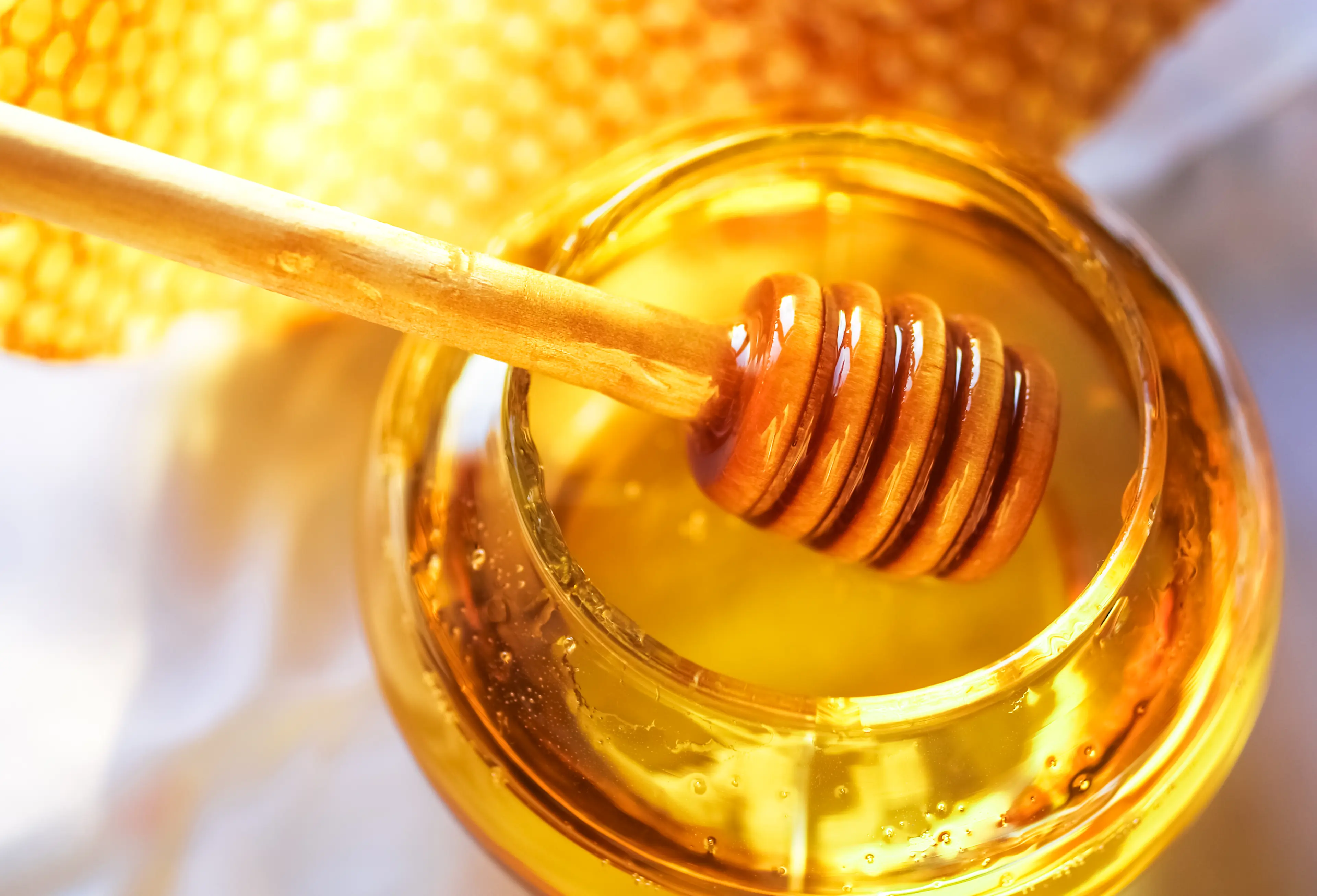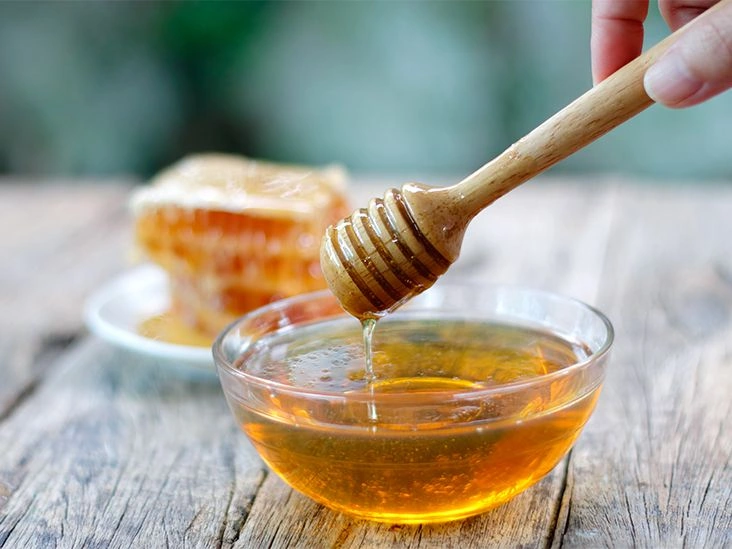
1. Supplies a range of nutrients
One tablespoon (about 20 grams) of honey contains roughly:
- Calories: 61
- Fat: 0 g
- Protein: 0 g
- Carbohydrates: 17 g
- Fiber: 0 g
- Riboflavin: 1% of the Daily Value (DV)
- Copper: 1% DV
Honey is largely composed of sugars, contains no fat, and provides only trace amounts of protein and fiber. While it does include modest levels of certain vitamins and minerals, most people do not eat enough honey for it to be a meaningful source of micronutrients.
Nevertheless, honey is notable for its content of plant-derived compounds called polyphenols, which can be beneficial to health.
SummaryHoney is mostly sugar, supplies small amounts of some vitamins and minerals, and is abundant in healthful plant compounds.
2. High in antioxidants
Minimally processed honey contains numerous bioactive plant compounds and antioxidants, including flavonoids and phenolic acids. Darker honeys generally have higher antioxidant levels than lighter ones.
Antioxidants neutralize reactive oxygen species (ROS) in the body, which can accumulate in cells and cause damage. This oxidative damage contributes to issues such as premature aging, type 2 diabetes, and cardiovascular disease.
Consequently, many of the proposed health advantages of honey are linked to its antioxidant profile.
SummaryHoney includes several antioxidants, such as flavonoids and phenolic acids.
3. May be gentler on blood sugar than table sugar
In terms of blood sugar control, honey might offer modest advantages over standard sugar.
Although honey elevates blood glucose similarly to other sugars, its antioxidant content may help guard against metabolic syndrome and type 2 diabetes.
Research indicates honey can raise adiponectin, a hormone that reduces inflammation and enhances blood glucose regulation. Some studies also suggest daily honey consumption may improve fasting blood glucose in people with type 2 diabetes.
That said, honey should still be used sparingly—especially by people with diabetes. Additionally, some honey sold commercially is diluted with plain syrup. Even though adulterating honey is illegal in many places, it remains common.
SummaryHoney might have slight protective effects on blood sugar management, but it should be used in moderation, particularly by people with type 2 diabetes.
4. Could support heart health
Honey may contribute to cardiovascular health. Reviews suggest it can help lower blood pressure, improve lipid profiles, regulate heart rhythm, and prevent cell death — all of which can benefit heart function.
An observational study of over 4,500 adults aged over 40 linked moderate honey consumption with reduced risk of high blood pressure in women. Animal studies have also shown that honey can shield the heart from oxidative stress.
Raw honey often contains propolis, a resin-like substance bees collect from certain plants. Propolis has been associated with improvements in cholesterol and triglyceride levels.
However, long-term human trials are lacking, and more research is necessary to clarify honey’s influence on heart disease risk.
SummaryHoney has been associated with benefits for heart health—such as lower blood pressure and improved blood lipids—but further human research is required.
5. Aids burn and wound recovery
Topical honey has a long history in wound and burn care and remains in use today.
A review of 26 studies on honey in wound management found it particularly effective for treating partial-thickness burns and postoperative wounds that became infected.
Manuka honey, in particular, has promising applications in burn therapy. Yet severe burns require emergency medical treatment and should not be managed solely with home remedies.
Investigators believe honey’s antibacterial and anti-inflammatory properties underlie its wound-healing effects.
SummaryApplied to the skin, honey can be an effective component of treatment for burns, wounds, and other skin issues. It is notably useful for diabetes-related foot ulcers.

6. May reduce coughing in children
Children frequently develop coughs from upper respiratory infections, which can disrupt sleep and reduce quality of life for both kids and caregivers.
Reviews of studies on pediatric cough show honey can be more effective than diphenhydramine at easing cough symptoms and may shorten cough duration.
Another review found honey may improve sleep for coughing children and their parents, and unlike some cough medicines, it typically has no side effects.
Importantly, honey must never be given to infants under 1 year old because of the risk of botulism.
SummaryFor children older than 1 year, honey can serve as a safe, natural cough suppressant and may outperform some over-the-counter options.
7. Simple to incorporate into your diet
Honey is easy to add to meals. To gain a small antioxidant boost, substitute honey where you would normally use sugar. It works well in plain yogurt, coffee, tea, and many recipes for cooking and baking.
Keep in mind that honey is a form of sugar and will raise blood glucose. Regularly consuming large amounts can contribute to weight gain and increase risk for conditions such as type 2 diabetes and heart disease.
SummaryHoney can sweeten yogurt, drinks, and recipes, and serve as a home remedy for minor wounds and coughs. Because it is sugar, limit your intake.
Frequently asked questions
What are the benefits of honey?
When consumed in moderation, potential benefits of honey include:
- support for blood pressure
- improvements in cholesterol
- wound-healing benefits when applied topically
- cough relief
- polyphenol content, which may benefit digestion and other processes
- antioxidant content that counters free radicals
What are the benefits of honey for men?
A review of human and animal studies suggests honey may assist men with erectile dysfunction by improving erections through vasodilation effects. It may also support sperm count and longevity and help restore testosterone levels.
However, more human research is needed to confirm honey’s effects on male health.
Is a spoonful of honey a day beneficial?
It depends on your overall diet and health goals. Moderation is important.
Honey is a carbohydrate rich in sugars (glucose and fructose), containing around 60 calories per tablespoon and a high glycemic index, meaning it can raise blood sugar quickly.
If you need to control blood sugar or manage weight, adding honey might not be ideal.
A daily spoonful could fit into a healthy diet if you limit other added sugars and focus on nutrient-dense foods. Consult a healthcare professional to determine whether regular honey intake is appropriate for you.
The bottom line
Honey contains compounds like antioxidants and propolis that may offer several health advantages.
It can be a better substitute for sugar in some contexts, but should still be consumed sparingly because it acts like sugar in the body.
Remember: do not give honey to infants under 1 year of age due to the risk of botulism.

























Leave a Reply
You must be logged in to post a comment.